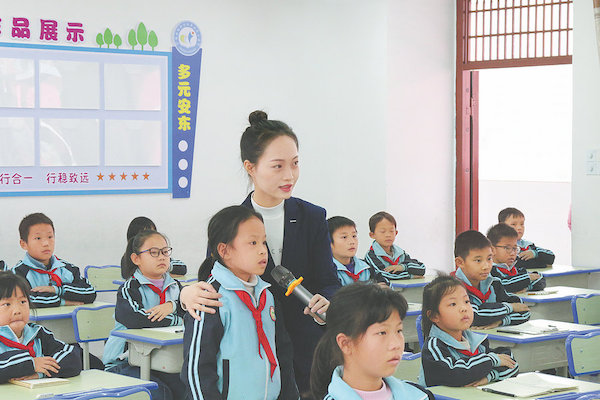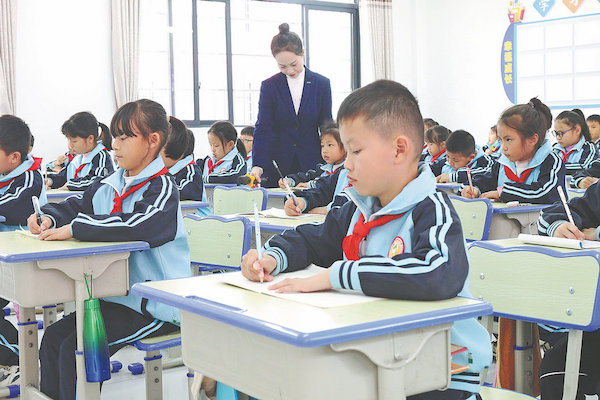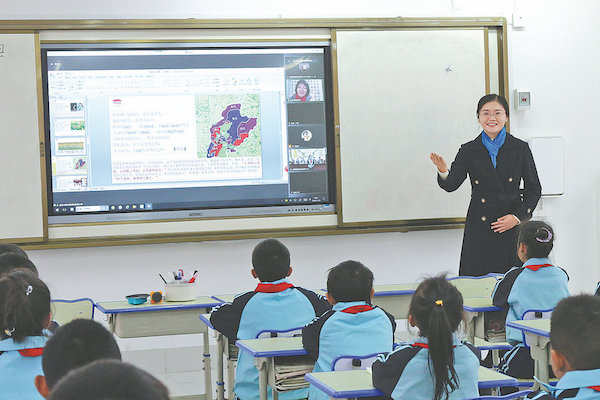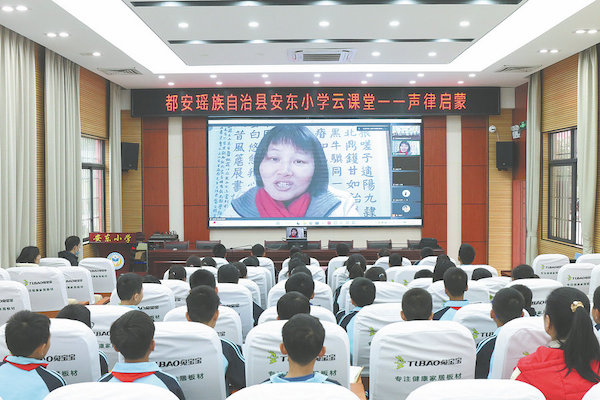Online teaching provides a valuable lesson

A student asks questions during an online class at Andong Primary School in Chengjiang town, Du'an Yao autonomous county, South China's Guangxi Zhuang autonomous region. [Photo by Wei Liangyan/China Daily]
Rural schools in South China's Guangxi Zhuang autonomous region get connected to more facilities and give students greater opportunities, report Yang Feiyue and Zhang Li in Nanning.
Zhang Jingwen had her prayer answered at an online space travel class. The 12-year-old got to learn about theories and anecdotes behind the Shenzhou XIV manned spaceship from a scholar thousands of kilometers away from her village home.
Not a new concept for many urban children, online education was a novelty to Jingwen and many of her rural counterparts.
Jingwen, a sixth-grader at Andong Primary School in Chengjiang town, Du'an Yao autonomous county, South China's Guangxi Zhuang autonomous region, relishes the knowledge she has acquired.
She jumped at the chance, at the online session in early November, and asked the expert on the other side of the screen about the odds of her getting to communicate with an alien.
The expert didn't give her a definitive answer but piqued her curiosity to dig further into the subject.
"I didn't dream of having the class on the subject and even getting a teacher to answer my questions," says Jingwen.
She has been fascinated by the stars but found little information, such as on TV, and there were no learning materials at school, which has more than 1,000 students.
"Most of the students are from villages," says Huang Zhaohua, the school headmaster.
Huang had been looking for ways to improve the teaching capacity and got what she wished for when she found that an online classroom program was producing fascinating results in Du'an county's Gaoling town, about 30-minute drive away.
The program brings rural schools access to quality education from the cities.
It all started when Chen Yanhui came on the scene.
After finishing his doctoral degree in physical electronics at Peking University in 2018, Chen engaged in high-tech work at the Guangxi development and reform commission.
In April last year, Chen was sent by the commission to Jiaquan village, Gaoling, as a first Party secretary.
When he paid a visit to Jiaquan Primary School, the only teaching spot in the village, the 35-year-old was heartbroken by what he saw.
It was the rainy season in May, the mountain moisture shrouded the teaching place that was hidden in the mountain. "The student dorm building was located on the hillside and some windows were broken, allowing moisture directly into the room," Chen recalls.
As he touched the quilts, some of them were so damp water could be wrung out of them.
That was when he decided to improve the school's infrastructure as a matter of urgency.
Under recommendation from the social organization bureau with Guangxi's civil affairs department, Chen decided to work with the Guangxi Youth Development Foundation.
More than 1.2 million yuan ($172,400) was used to upgrade the school and to construct a library, calligraphy room and a reading garden.

A teacher checks a student taking class notes. [Photo by Wei Liangyan/China Daily]
Children from neighboring villages, whose parents had left home to earn a living in bigger cities, have also been encouraged to join the school.
Yet, it soon came to Chen's attention that the infrastructure upgrade was not enough.
He noticed that the insufficient learning resources for comprehensive development courses were a major obstacle against rural schools, and he knew he had to do something.
"I found out that the school actually has an 'all-in-one' multimedia teaching machine that can be connected to teaching resources outside through the network," Chen says.
Then he came up with the idea of tapping into the rich urban education supplies and transferring them to the rural classroom via the internet.
Since Du'an got out of poverty in 2020, the county has installed more than 2,200 such multimedia machines for about 400 local middle and primary schools through an "education informatization" project.
Jiaquan village is one of them.
"Now that villages have all been connected to the internet, while many of my classmates and friends have teaching support experience and care about rural education, it's possible to bring the two sides together," Chen explains.
His idea of the cloud classroom immediately got support from the local government and volunteers.
Faculty members and graduates from Peking University contributed to the design of the curricula.
The idea is to have experts from all walks of life to give lectures that are tailored to the needs of students in the fourth to sixth grades.
"The content will not be about school subjects, but focus on traditional culture," Chen says, adding that the goal is to have children exposed to art and science, such as poetry, calligraphy and music, and broaden their horizon.
Zhao Yanfen, associate professor from the School of Chinese As a Second Language, Peking University, was invited to serve as a teacher and chief consultant in course design.
"Our starting point is to enable children to be exposed to the essence of good traditional culture from an early age and to nourish their bodies and minds with rich extracurricular knowledge," Zhao says.
"At the same time, we add music, calligraphy, psychological education, astronomy and other courses so that children can better perceive the truth of how to conduct themselves," Zhao says.
To date, professors from the Peking University, researchers from the Palace Museum, teachers from the China National Opera and Dance Drama Theater, as well as college students from the Beijing Normal University and the Minzu University of China have all joined Chen's cause, which took off in March.
The online classes have become a hit with students since the launch. "We make use of the 'interest-fostering class' time and give the children a weekly livestreaming class," he says.
"A total of 10 classes have been tried in Jiaquan village, and the children have positively changed a lot and quickly, which gave us a lot of confidence."
Word spread fast, especially in the rural areas of Du'an where educational resources are eagerly sought.

A teacher gives an online class at Andong Primary School. [Photo by Wei Liangyan/China Daily]
More than 20 primary schools across Gaoling town then followed suit and tuned into the online classroom.
It didn't take long before Huang Zhaohua from Andong Primary School heard of its success.
"I sat in on the online classes myself, and found them a nice complement to what the school offers," Huang says.
She applied them to more than 30 classes of the school in October.
"Although there is now a vast amount of knowledge available online, it takes a lot of time and effort for schools to screen this information," Huang says.
"It is much more difficult to find resources that really fit the psychological conditions and the acceptance level of children in this age group," she adds.
She believes that the online classroom is customized for primary school students and can help protect and stimulate children's curiosity.
"The children can communicate and interact with experts and scholars in various fields without having to leave home, which will encourage them to learn," Huang says.
Moreover, the classroom program also offers faculty training, such as Mandarin, which Huang says is of great benefit to ethnic teachers.
"We have also asked our teachers to listen carefully and take students to do some extended thinking after the (online) class to develop their interests.
"Next, I hope that the course will be more systematic and increase the training of teachers in such areas as teaching etiquette," Huang says, adding that the format of livestreaming class training can achieve full coverage "at our teachers' level as compared to our existing training mechanisms".
To date, more than 20 teachers have joined the program, and classes, including those on calligraphy, painting and astronomy, have been given on a regular basis.
At its peak, more than 10,000 students from rural Guangxi listen to a class simultaneously.
"The teachers are knowledgeable and give lively classes, and they also carry out online interactive communications, which is of great interest to the students," says Wei Deng, headmaster of the Gaoling Central Primary School.
"They can see a wider world outside, and the seeds of exploring the knowledge are planted in their hearts," Wei adds.
Li Jianjun, Party secretary of Du'an, says that he hopes the learning mode can be promoted to benefit more schools in the country's remote mountainous areas and thus help high-quality education development.
So far, positive influences have already shown themselves in the student response.
"It felt magical how a teacher can teach us thousands of kilometers away," Jingwen says about her experience at online classroom.
Ever since Jingwen took the space travel class, she has taken the initiative to read up on related materials.
"I have known where I can find what I'm looking for through the online class," she says.
Moreover, her interest in dancing and music has also been satisfied through the rich classroom arrangement.
"I think my biggest take-away from these lectures is I realized that people need to have their own interests so that they can experience more fun outside of classroom, enjoy learning and life," she says.

Students take an online class in Chengjiang town, Du'an Yao autonomous county, South China's Guangxi Zhuang autonomous region. [Photo by Wei Liangyan/China Daily]
